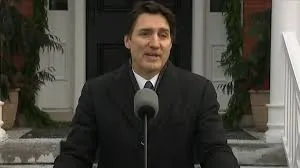
The Implications of Justin Trudeau’s Resignation and the Suspension of Parliament in Canada
Canadian Prime Minister Justin Trudeau has announced his resignation after nearly a decade in office, citing internal conflicts within the Liberal Party and declining public support. He will remain in his position until a new leader is chosen. To facilitate this transition, Trudeau has suspended Parliament until March 24, 2025.
Trudeau’s decision follows a series of poor polling results indicating a potential loss to the Conservative Party, led by Pierre Poilievre, in the next election. His popularity has waned due to various issues, including economic concerns and the resignation of Finance Minister Chrystia Freeland, who accused him of political gimmicks.
The suspension of Parliament, known as prorogation, is intended to allow the Liberal Party to conduct a leadership contest without the immediate pressure of parliamentary proceedings. This move also prevents the opposition from passing a non-confidence vote, which could trigger a federal election.
Potential candidates to succeed Trudeau include former Finance Minister Chrystia Freeland, former Bank of England Governor Mark Carney, and Member of Parliament Dominic LeBlanc. The Conservative Party currently holds a commanding lead in the polls.
Trudeau’s resignation marks the end of an era characterized by progressive policies on women’s rights and climate change. He has called for a party reset to restore productivity in Parliament and provide Canadians with a clear choice in the upcoming elections.